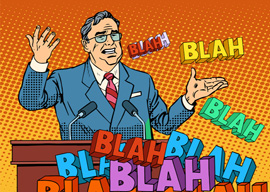
September 03, 2016

Source: Bigstock
I am never sure whether I should lament the state of the world or be complacent about it. For on the one hand everything is going to the dogs and on the other I am a happy man.
Part of my happiness derives, of course, from intimations of approaching apocalypse: There is nothing quite like them for cheering oneself up. That is why I bought a book the other day by Chantal Delsol, the distinguished French philosopher, called La haine du monde (Hatred of the World), in which she maintains that there is in modern, post-religious Prometheanism more in common than we might like to think with totalitarian regimes of the past. Admittedly, we have no state-organized terror, no gulags or concentration camps, this being a very important and significant difference that ought not to be forgotten. But on a philosophical level, at least, there is something in common between our totalitarian regimes and our democracies, as Solzhenitsyn and Vaclav Havel discovered to their chagrin.
According to Delsol, that something in common is the belief that the world is there to be made, and that nothing is given. For the Promethean, the past is nothing but a catalog of crime and folly, as Gibbon said, and the world nothing but the material for the manufacture (by them) of perfection. There are no intrinsic limits to man’s destiny; there is no tragic dimension to his life. He can make anything of himself that he likes and is therefore perfectible. It supposedly follows from the fact he is perfectible that he ought to be perfected. Perfected not spiritually, not on some other metaphysical plane beyond this material world, but here and now. Liberation is the achievement of total, permanent, and unchanging happiness, from which such inconveniences as conflict and death have been banished.
I sympathize with what she says. In her opinion, the current fashion for transhumanism is the latest form of mad Prometheanism which underlay totalitarian regimes. Transhumanism is only another manifestation of the desire to make the New Man, the Old Man being so unsatisfactorily inclined to defects both of mind and body. All hitherto existing men have been but pale apologies for the glorious creatures of the future, who will be half biological and half electronic. Just as Marx thought that man would only become truly human once communism was achieved (such matters as private property and class conflict having deformed him and made him less than human), and as the Nazis dreamed of a perfect race of blond beasts uncontaminated by bad blood, so the transhumanists dream of creatures of eternal life whose powers will make Usain Bolt seem like a sea urchin and Einstein a child with severe mental handicap.
I met a transhumanist the other day who said he wanted to live forever (on condition, of course, that he did not age). He said he would not mind in the least being implanted with chips to improve his performance in all spheres of human endeavor. After all, he said, no one objected to wearing spectacles. (Actually, this is not so. Although inclined by inheritance to short sight, the people of North Korea do not wear spectacles, at least in public; for that would suggest the failure of the regime to have solved all problems. And the first dictator of independent Equatorial Guinea, Macias Nguema, had people with glasses killed, on the grounds that they were likely to be intellectuals and therefore dangerous.) What, asked the young transhumanist, was the difference between spectacles and implanted chips? Of course, on this basis anything can be made to be like anything else: What is a pig if not a mass of molecules, as is the Encyclopaedia Britannica? I thought I espied the gleam of madness in his ideas: Nothing could or would get in the way of his utopia of perfect immortal beings, and all disasters en route would be written off as mere teething troubles, nothing for us to worry about, just as the gulag was nothing to worry about on the way to the Soviet heaven.
But it is not only transhumanists who are such total Prometheans. So too are our politicians. They believe that they can, and ought to, transform society in the direction of “liberation.” Their idea of liberation is the post-religious one of man totally freed from all particular or specific circumstances, especially a historical past, so that he is free to be that glorious creature, himself. The untrammeled self: That is the goal of liberation.
The politicians are not entirely to blame; they are, in fact, following the electorate as well as leading it. Ledru-Rollin, the French radical politician of the 19th century (after whom a street in Paris is named), said that he was a leader and therefore had to follow. We are all limitless Prometheans now, or at least the great majority of us who are in that diffuse class that ultimately decides society’s direction. After transsexualism will be incest liberation, and after that, who knows? But something will be found, for it is limits as such that we object to, not to any limits in particular.